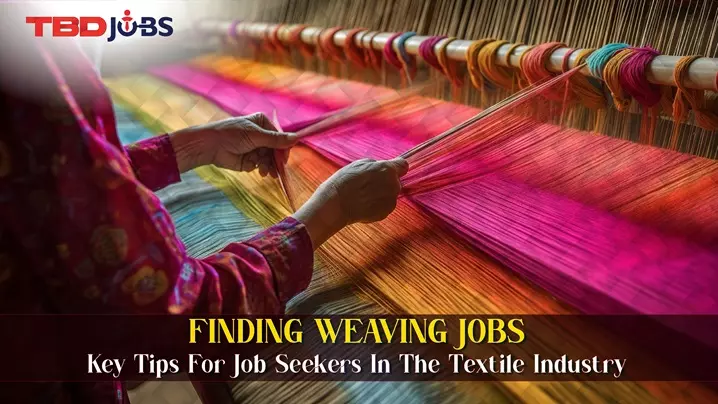The fabric world has been a part of human civilisation, from simple handlooms to high-tech machines that create complex textures. The technical textiles market now ranks as one of this sector's most vibrant and promising areas, as someone who has witnessed this change closely.
Understanding the Technical Textiles Sector
The technical textiles industry is not merely fabrics but a revolution marrying innovation, technology, and functionality. Technical textiles are unlike conventional textiles; they are functional textiles that provide specific functions such as protection, filtration, reinforcement, and medical uses. These are extensively utilised in the automobile, aerospace, healthcare, agriculture, and construction industries.
Why Technical Textiles Jobs Are in High Demand
The increased worldwide emphasis on innovation and sustainability has raised the stature of technical textiles. The government and private enterprises are making considerable investments in this sector, which has led to a boom in employment opportunities.
This is what makes this sector so attractive:
- Multiple Applications: From geotextiles in construction to medical textiles in healthcare progress, the number of applications means numerous career options.
- Global Reach: Professionals can practice in global environments, with the technical textiles market growing across continents.
- Innovation-Driven: The sector thrives on innovation and is a fascinating playground for creative minds.
Finding Opportunities in the Technical Textiles Industry
If you have an interest in innovation and want to be involved in a field that touches multiple industries, technical textiles provide numerous career opportunities:
1. Textile Design and Development
Design and development involve creating new products to address industry-specific requirements. From flame-resistant fabrics for firefighters to lightweight composites for aircraft, this field is where professionals can marry creativity with technical knowledge.
2. Manufacturing and Production
Production of technical textiles demands a specialised understanding of sophisticated machinery and production techniques. Roles in this area include production managers, quality control specialists, and machine operators.
3. Research and Development (R&D)
R&D is crucial in technical textiles because innovation lies at its core. Researchers are working on new material development, product improvement, and sustainable solutions.
4. Sales and Marketing
With the global market for technical textiles expanding, sales and marketing professionals are needed to bridge the gap between manufacturers and consumers. Understanding the product's technical aspects and market potential is key in this role.
5. Technical Support and Consultancy
Experts here help customers comprehend and leverage technical textiles optimally. These experts combine technical knowledge with customer relationship management skills.
Global Trends That Are Guiding the Technical Textiles Industry
While we dive into the immense possibilities offered by the industry, it is impossible not to mention the trends that are powering it ahead:
- Sustainability Initiatives: As environmental concerns increase, demand for sustainable technical textiles is increasing.
- Smart Textiles: Embedding electronics in textiles opens up a new horizon for wearable technology and smart fabrics.
- Global Collaborations: Cross-border collaborations are driving innovation and market growth.
How TBD Jobs Assists You in Shaping Your Career
TBD Jobs understands the dreams and aspirations of professionals to excel in the industry. Our platform connects job-seekers with employers who appreciate innovation, experience, and commitment.
As a seasoned professional or new graduate, TBD Jobs portal offers a textile careers that match your ability and aspirations. From jobs in textile apparel to speciality jobs in technical textiles, our organised listings guarantee you discover opportunities that align with your career aspirations.
How to Prepare for a Career in Technical Textiles
Joining this exciting industry takes a combination of education, skills, and interest.
Here are a few tips to begin with:
- Educational Background: Obtain degrees or certifications in textile engineering, material science, or allied streams.
- Skill Development: Stay current with the most recent trends and technologies in the technical textiles sector.
- Networking: Participate in industry forums and seminars, and network with professionals on platforms like TBD Jobs.
- Experience: Opt for internships or entry-level jobs to have practical experience.
The Future of Textile Industry Careers
Technical textiles play a decisive role in this industry. As the world's demand increases, opportunities for this sector will only continue to grow. From combating climate change issues to improving everyday life through creative fabrics, technical textile careers are as rewarding as they are powerful.
Final Thoughts
As a person who is highly motivated by the development of the technical textiles industry, I see it as the future of the fabric business. The future is limitless for those ready to transform and shift their perception beyond national lines.
It is made easy for you to traverse this promising industry with TBD Jobs at your side. Explore textile careers that suit your passion and enable you to build a brighter, more innovative future.

















.webp)














Leave a Comment
9 Comments
24 Dec 2025, 05:25 PM
01 Jan 2026, 02:38 PM
07 Jan 2026, 03:45 PM
21 Jan 2026, 09:09 AM
23 Sep 2025, 08:13 AM
01 Oct 2025, 11:56 AM
04 Feb 2026, 04:46 PM
17 Oct 2025, 11:25 AM
12 Dec 2025, 07:01 AM